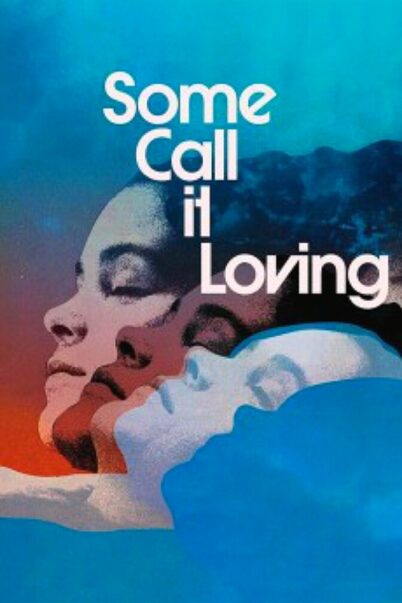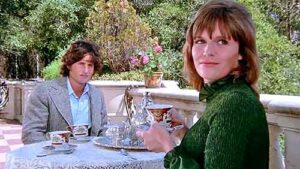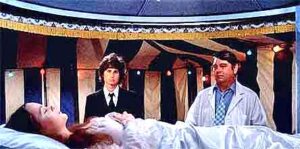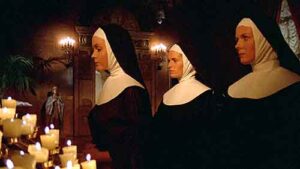The altogether bizarre second feature directed by James B. Harris, Stanley Kubrick’s former producing partner (on THE KILLING, PATHS OF GLORY and LOLITA) who proved himself every bit as idiosyncratic a filmmaker. Preceded by THE BEDFORD INCIDENT (1965) and followed by FAST-WALKING (1982), COP (1988) and BOILING POINT (1993), SOME CALL IT LOVING (1973) was based on John Collier’s 1938 story “Sleeping Beauty,” mixed with elements from Harris’ own life—he calls it “a home movie, made with real production (values).” It wasn’t a hit (unsurprisingly), but did leave an imprint; Harris claims Kubrick’s EYES WIDE SHUT (1999) was directly inspired by SOME CALL IT LOVING, and I’d add that LOST HIGHWAY (1997) shares many elements (and a pivotal cast member) with Harris’ film.
Furthering the film’s staying power was the presence of future mega-producer Charles Roven (OPPENHEIMER) as assistant producer and the late actor-turned-erotic-film-impresario Zalman King (1942-2012). King headlined SOME CALL IT LOVING and, if claims made by certain crewmembers are to be believed, had a not-inconsiderable influence on its creative direction.
King plays Robert Troy, a jazz musician who lives in a castle-like mansion where he spends his days playing erotically tinged role-playing games with the luscious Scarlett (Carol White) and Angelica (Veronica Anderson), and in his off-hours hangs out with Jeff (Richard Pryor), a not-long-for-this-world junkie. Idling around a carnival one night, Troy happens upon a “sleeping beauty” hawked by a sleazy doctor (Logan Ramsey) who challenges male bystanders to kiss the beautiful Jennifer (Tisa Farrow)—but warns that “he who awakens the sleeping beauty is in danger of awakening himself.” Jennifer has apparently been asleep for eight years, but she’s actually medicated, with nurses attending to her medical needs.
Smitten, Troy bribes the doctor into selling him the sleeping beauty. He takes Jennifer back to the mansion, where he wakes her up and promptly falls deeply in love (unlike the Collier story, in which the no-longer-sleeping beauty proves so unpleasant the protagonist puts her back to sleep).
As the doctor warned, Troy undergoes an awakening of his own, becoming disenchanted with the artifice of his life. Ridding himself of that artifice proves extremely difficult, especially when Scarlett and Angelica induct the fatally naïve Jennifer into their erotic game play. Troy decides to take Jennifer away from the mansion and its denizens, but discovers that his fear of self-exposure is a powerful, and perhaps insurmountable, buffer to happiness.
The protagonist’s profession as a jazz musician is appropriate, as the film plays like an extended jazz fugue in its sense of unpredictability and improvisation (best exemplified by Richard Pryor, who reportedly ad-libbed all his dialogue). The glacial pacing is integral to the creation of an atmosphere summed up by one character’s observation that “I feel like it’s all a dream.” Featured are lengthy scenes of characters walking and dancing, viewed through some of the most deliberate camera movements you’ll ever see, and a lead performance that’s downright inscrutable (King always seems to have a blank yet curiously intent look on his face). Nor is there much in the way of explanation for the complex psychological aberrations that power the narrative, with the spectator left to find his/her own way through it.
Yet patient viewers will find a gorgeously lensed, mesmerizing and altogether unique film. It may not work as a surreal love story, nor an erotic drama (Harris was apparently still smarting from the experience of making the heavily censored LOLITA, and so dialed back the naughtiness), but as an amalgamation of both SOME CALL IT LOVING makes for a memorable oddity.
Vital Statistics
SOME CALL IT LOVING
James B. Harris Productions
Director/Producer/Screenplay: James B. Harris
(Based on a story by John Collier)
Cinematography: Mario Tosi
Editing: Paul Jasiukonis
Cast: Zalman King, Carol White, Tisa Farrow, Richard Pryor, Veronica Anderson, Logan Ramsey, Brandy Herred, Pat Priest, Ed Rue, Joseph DeMeo




